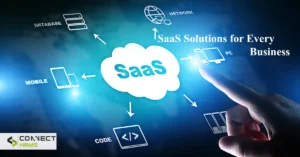Modern organizations now consider Human Resource Management Systems (HRMS) to be indispensable tools, especially when it comes to managing remote teams. HRMS software has evolved to address the unique opportunities and challenges of distributed teams in the era of remote work. The Connect HRMS’s Employee Self-Service (ESS) module plays a crucial role in fostering improved teamwork and communication among remote workers. In this context, let’s explore the benefits of the ESS module and HRMS for remote teams.
Centralized Data Management
HR professionals can access and update employee data from any location thanks to HRMS systems, which serve as a centralized overview for this information. This is particularly beneficial for remote teams as it ensures that HR and employees have easy access to critical personnel data. By allowing remote workers to view and update their personal information, including contact details, tax forms, and emergency contacts, the ESS module promotes self-reliance and reduces administrative burden.
Efficient Onboarding and Offboarding
Efficient onboarding and offboarding are essential even in a remote work setting. The HRMS, when used in conjunction with the ESS module, streamlines these processes by providing remote workers with access to company policies, training materials, and relevant documentation. Offboarding is equally efficient, ensuring the secure return of company property and the termination of system access, both of which are crucial for data security.
Real-time Communication
The ESS module enables real-time communication between HR staff and employees. Remote workers can easily submit requests for time off or expense reimbursement and receive quick confirmations or feedback via the system. This encourages faster response times and reduces delays associated with email exchanges.
Feedback and Performance Management
Maintaining open lines of communication about progress and performance appraisal can be challenging for remote team members. Employees can set goals, track their progress, and receive regular feedback from peers and management through HRMS platforms. This fosters a culture of continuous development even in remote environments.
Self-service Management Benefits
Using HRMS with the ESS module simplifies the management of employee benefits, a task that was previously challenging. Working remotely gives employees access to a single platform for benefit enrollment and management, beneficiary updates, and document access. As a result, HR has less administrative work, and remote employees are better equipped to make informed decisions regarding their benefits.
Enhanced Compliance
Working remotely often presents unique legal and compliance issues depending on the region. When an HRMS with the ESS module is in place, it can help ensure that remote workers understand and can comply with relevant labor laws and company regulations, reducing the risk of legal issues and compliance violations.
Data Protection
HRMS provides a secure environment for managing sensitive employee data, which is of utmost importance to remote teams. With the ESS module, you can grant remote workers restricted access to their data, ensuring that private information is shielded from unauthorized access.
Real-time Reporting and Analytics
HRMS systems have the capability to provide real-time reports and analytics, offering valuable insights into the performance, satisfaction, and engagement of employees in remote teams. This data enables informed decision-making and continuous improvement of remote team management techniques.
Conclusion
When combined with the ESS module, Connect HRMS offers a comprehensive solution for managing remote teams and enhancing communication. In addition to ensuring data security and centralizing data, it fosters a culture of compliance and self-service, expedites administrative processes, and provides valuable insights for businesses looking to thrive in a remote work environment while maintaining a motivated and effective staff.





